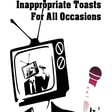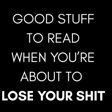Become a Creator today!Start creating today - Share your story with the world!
Start for free
00:00:00
00:00:01

Guest: Author and Advocate Lyric Rivera--The Neurodivergent Rebel
This week the Neurodivergent Rebel joins us to discuss their book detailing how bosses and employees can create better environments for neurodivergent people in the workplace. We also talk scary movies, medical care in America, how demographics can influence care. Wednes tells about her lesbian lizard collection and we spend time opining on why dating can be a lot more fun when you're already cuffed.
A transcript of this episode can be found here.
Transcript
Introduction to the Mentally Oddcast
00:00:02
Speaker
You are listening to The Mentally Oddcast, where we talk with creatives about neurodivergence, trauma, addiction, and all the other things that impact and inform our art. Our goal is to show everyone that no matter what you're going through, you are not alone and you can make art about it.
00:00:34
Speaker
Hi,
Guest Introduction: Lyric Rivera
00:00:35
Speaker
friends. It's me, Wednesday, Lee Friday, and you are listening to The Mentally Oddcast. We are brought to you by sometimes hilarious horror. This week, our guest is Lyric Rivera, who is multiply neurodivergent, a self advocate, and runs the internationally recognized Neurodivergent Rebel blog, and is the author of the bestselling business ethics book, Workplace Neurodiversity Rising.
00:01:02
Speaker
hi ah Hi, Lyric. Thank you so much for being here. Thank you for having me. I'm honored. I'm excited to have this conversation today. This will be fun. It took a while to schedule this. It seems like the the people that I have on are at least as busy as I am. So it can be pretty tricky even ah remotely to schedule these interviews. So I'm so glad that you're finally here.
Childhood Fears and Memories
00:01:24
Speaker
um Before we get into like the heavy stuff, we like to start out by having our guests tell us the story of the first scary movie that you remember seeing. Oh, this is a good one. But I don't this is one that I don't know if most people would think is scary. ah But to me, it was really scary as a very like logical analytical child.
00:01:43
Speaker
Uh, it was, we saw Jurassic Park in the theater and I think I was in like elementary or preschool or something. So I was like really young. Uh, and just like, because they explained like the science of how they could really do this, but I'm like, cause I'm just like, but mom, they really could do this. Like, I was terrified. They had a giant like window behind my bed and just like, I, all I could think of was that T-Rex crashing through with this big teeth and the roof of that car. I was like, I could not sleep for, I don't know. It's a long time. Wow.
00:02:13
Speaker
Yeah, I think that personally, I would not think of Jurassic Park as a horror movie. But philosophically, if children are in danger of being eaten alive, that certainly counts as horror, right? I mean, we all love Samuel L. Jackson. Nobody likes seeing that arm. No. And but I love that movie. It's still like I love the Jurassic Park movies. Don't get me wrong. There's still like some of my favorite movies.
00:02:37
Speaker
But that's the only movie that ever really scared me. Like I've seen horror. It just like doesn't, it doesn't scare me. But as a kid, Jurassic Park, that gave me nightmares. Sure. Well, that, that certainly makes
Challenges in Texas vs. Colorado
00:02:49
Speaker
sense. Now I'm aware actually that you live in Texas. Um, and I am guessing that for someone in your demographic, that that would have a lot of challenges. How is that going for you?
00:03:02
Speaker
You know, it's a, it's an adjustment period because we we were traveling the country we were very fortunate to be like full timing and in an RV across the country for the last two years and now, like this is where we need to be for an extended period of time in our lives. and you know, this is where we're from and families and things. And so, you know, we just were brought back here for for a time period. um It's really interesting to see because like, like there are literally like you go to the square and there are people with their um Confederate flags and preaching hate and anti-queer rhetoric, like with signs, like preaching to children in the streets about how bad queer people are. And it's just like, wow, you didn't see this in Colorado.
00:03:47
Speaker
okay groommor yeah Ann Arbor, for example, where I am, is considered very liberal. There's Trump people here. It's not like there aren't, because there's rich people here. And where there's rich people, eventually, there's going to be rich people that don't want to pay any taxes. But yeah, Texas, like I had a friend of mine who wanted me to come visit him, and I was afraid. i like is it I mean, is it really safe for me to bring my husband? I mean, I'm in what J.D. Vance would call a two
00:04:20
Speaker
What did he call it? A two colored marriage. okay My husband's a black guy. So I wasn't sure necessarily like are are we honestly, are we going to be close and safe and in Texas? my You know, we're all right. But yeah, but like we they're having places you get looks, you know.
00:04:36
Speaker
stuff happens. Well, and the the scariest thing about it is that I grew up a ah white kid from a conservative, like middle class family. So we thought that if something was wrong, you would call the police and the police would come and help you. yeah And as an adult, I've learned that that's not as universal as as I was taught that it was. That's one of those things about Texas, especially since I watch a lot of horror movies. There's a whole bunch of Texas Chainsaw Massacre movies where you you try to you you finally get to the cops and you're like, oh, yay, I'm safe. I made it to the cops. And then it turns out that the cops are in on it. so yeah I'm sure not everything in Texas is like a chainsaw massacre, but surely some things are. Yeah, you know sad sad but true. But true.
Understanding Neurodivergence
00:05:30
Speaker
Oh, gosh.
00:05:32
Speaker
I would like to talk about the word neurodivergence because I use it in the description for this show. um Some people think that it just straight up means that someone is autistic. Other people will apply it to things like bipolar disorder, ah psychosis, ADHD, PTSD.
00:05:50
Speaker
what ah What do you consider to be the correct definition of the term? Yeah, well, like the original definition by, was it Cassian Asimasu? I mean, I probably got the name wrong, but the person who coined the term neurodivergent was intended to be anyone whose brain has any kind of like, I think they describe it as like, where there's a little wonky or a difference in perception or a difference in how they experience the world that originates in the brain and nervous system.
00:06:18
Speaker
And I'm paraphrasing because I don't know the exact wordage. But basically, you know, the way I try to think about it and also explain it to other people is a lot of times wait the conversation around neurodiversity is really led by autistic people and people who are born with neurodivergence who have been that way our whole lives.
00:06:36
Speaker
But it's not limited to autistic people and ADHDers because really it's any kind of divergence in the brain. And then when you think of all the different ways human brains can diverge, ah you you know, we sometimes we're born with differences. Sometimes we develop differences in our lives. You know, our our brains, um you know, through trauma is a good example. Like our brain, the way we perceive the world, our emotions and experience.
00:07:03
Speaker
ah the world around me or the world around us. oh i hear a dog you go jump on back down i know she just came come over over here um the the The way we experience you know the world around us can be majorly altered either forever or short term or you know can be permanent or temporary but but it doesn't matter how or why we have a difference in perception, what matters is honoring that perception and giving people space to you know have different experiences that we might not understand and making room for experiences we don't understand. and
00:07:43
Speaker
You know, just being curious instead of judgmental on people because we have all these differences we might, we don't even really know about, you know, from sensory things to, you know, emotional things. And you that includes like a lot of mental health diagnoses that includes some neurological things like dyspraxia and apraxia that can affect motor control because sensory motor. So there's a lot of things. It's basically just like the divergences and the the diversity in the brain, basically. Okay.
00:08:13
Speaker
So ah really a catch-all term that would focus on things that you could look up in the DSM, for example, something that you could point to. it you know Outside of the average, really. you know and and there's all you know if you are But you it's not always in the DSM, though, because, for example, like if you're colorblind, that's the way you diverge. And I'm pretty sure that's not going to be in the DSM.
00:08:38
Speaker
Okay, all right.
Impact of Undiagnosed Autism
00:08:40
Speaker
So can you tell us about your diagnosis? Like what how old were you and was your first diagnosis accurate? Uh, so my guardians like were referred to get me screened for ADHD when I was in elementary school. Uh, but this was back in the nineties and they were really afraid of me being forcibly medicated with Ritalin cause I was like the big thing then. And so they fought back against having any kind of testing for learning disabilities done in school, which really
00:09:12
Speaker
I mean, I get that they were trying to protect me, you know, because they were afraid of what could happen if I was, you know, they thought I was gonna get some label put on me was their fear. Right. Sure. But I had labels, like my labels instead, like because it was like, I was treated as someone with a neuro average brain. and Anytime I expressed struggles that my peers didn't have, it was seen as me not trying or me having bad behavior. and It was treated behaviorally as something that needed to be squashed instead of supported and cared for. And so I wasn't treated with a lot of compassion and I was treated as if I was defiant and I was rebellious and I was stubborn.
00:09:51
Speaker
and I was too sensitive and I complained too much and so like all of these labels were already put upon me but they were really not so nice labels and so like I believed I was just this broken failed flawed version of my peers because they were the standard by which I measured my life to and you know that that's who I was measured against in school and when I couldn't do things that they found simple like it was used as like look you must not be applying yourself and especially because like I was really skilled in reading like off the charts they couldn't even test my reading level with the elementary school tests
00:10:28
Speaker
And because I read so well, they use that to be like, Oh, this kid's really sharp. They get it. They have high vocabulary off the charts. So everything else must just mean they're not trying or they're being lazy. And so it was like, I gotcha. Oh, look, see, you can read. so That must mean you are not trying in math and everything else is just you being bad and not applying yourself because look what you can do in this one area. And it was like, expected I could be an expert at everything. And anything short of that was like, just me choosing not to succeed because I had the potential. Well, and that's, that's so common. I mean, I, I definitely went through that and I didn't even understand that that was what was happening until years and years later. I mean, I was in my forties before somebody said, you know, you're probably autistic and you have ADHD, right? it like No, of course I don't know that. Why on earth would I know that? I'm just really like bad. I'm just a terrible person with no follow through.
00:11:23
Speaker
and and i went Actually, at one point I went through Michigan Rehab Services, which was about, ah they they gave me job training, which as a college graduate, I felt so defeated to have to go to this thing where they would test my motor skills to see if I could work at a factory. and i had all this like first of all I had I was very disappointed in myself and I had a lot of classes hang ups about how dare you suggest that I work at a factory that's for a different kind of person that didn't go to school like I did like just these douchey like reasons I didn't want to work in a but I mean I work fast food I shouldn't have to work in a factory I paid my terrible job dues yeah but but no that is such a thing this idea that like if you're smart you should be able to
00:12:12
Speaker
think your way past any condition that you might have. And it wasn't possible. No, if that were possible, most of us would have done it by now. And then I forgot I didn't answer about the diagnosis. I didn't even get there. Please, go ahead. So then there was an opportunity for a diagnosis that didn't happen. It didn't happen because fear. But then I was only diagnosed years later when I was almost 30.
00:12:41
Speaker
because I was in a job that and was treating me a lot like I was being treated in school where my needs were the problem. And so I was constantly being picked apart for things like my body language, my posture, for ah not being social enough and making friends and bonding with my colleagues appropriately and not putting enough effort into socializing and like making Connections with my other employees I was working with which is wild to me and then you know like little things like typos and I was just being picked apart for things that ended up being part of my neuro divergence and I was just like internalizing so much shame and just like my mental health was falling apart and then
00:13:22
Speaker
Uh, we moved to an office where the sensory environment was really bad for me, a lot of fluorescent lighting and busyness and chaos. And they started asking me to come into the office, uh, when I had really been only supposed to be there like once a week for half day. And then they were like, we want to hear every day cause we want to see you. They see you working and it's like, we don't see you. We don't know what you're up to. And I'm like, that's.
00:13:43
Speaker
terrible way to do things but like so under that like new expectations increased pressure and that changed like I started to get really sick and I started wasting away and I was having like really frequent migraines like every day I was at the office and I was having seizures and other like neurological things happening and oh no My doctor was doing all these tests and we were trying diet changes and we were trying all these different things and nothing was working. A lot of things were actually making stuff worse. And she was out of ideas, really. And so she's like, you know, I think maybe it's anxiety. I want to refer you to a mental health assessment. And I was kind of like, oh, you think it's all in my head? You know, I was kind of.
00:14:23
Speaker
Especially with that because i'd I'd heard that before when I was a kid and nothing really came over it because my family was kind of I guess maybe on mental health assignment or you know or something mental health thing like
Creating Inclusive Workplaces
00:14:35
Speaker
avoiding avoidant when I was growing up and so I finally was like because I remembered like there's just a little nagging and because I had been reading a book about animal behavior that was written by an autistic person it was a Temple Grandin book and I was like I had related so much to her experience how she described, you know, her world. And I was like, Oh, it's just like me. It's really weird. But then when I went and googled autism, I was like, I read the symptomology, you know, and I was like, Oh, no, you know, because I didn't understand you know myself that way. And I didn't understand, like, now I understand what they're saying, by the way they say it. But I didn't know that back then as a lay person. And so I was like, Oh, no, it's not me. And so I put it away. And then I was like, well,
00:15:15
Speaker
If I'm going to go get some you know mental health assessment, can I see someone who knows about autism? And she's like, well, I don't think you're autistic, but sure. And she gave me a card. So I got the referral. Um, and so that's how I ended up going to see a specialist that for autism and anxiety that diagnosed me with autism and social anxiety, uh, you know, six months before my 30th birthday. And it was like this boom moment that just changed how I think about myself, everyone in the world around me, because it was like, Oh,
00:15:42
Speaker
wow you know and yeah yeah it's it's like adjusting the lens you know in a camera that like everything the the focus completely changes and things make more sense than they did yeah And that's such, I mean, you've hit on so many important things there, one of which being that a lack of awareness about neurodivergence, I mean, it it hurts everyone because ah from an employer standpoint, obviously the smartest thing to do as an employer is to create an environment that lets everyone thrive. And when you're so worried about cramming people into little boxes and cubicles and making sure you can watch to see if everyone's, well Why the fuck would you hire someone that you thought you had to watch the whole workday to make sure that they're working? Like, you know, you should be a kindergarten where you shouldn't, but, you know, yeah you know, that's that kind of micromanagement. Like nobody likes that. Even neurotypicals do not like being micromanaged in that fashion. Exactly.
00:16:46
Speaker
and And that's something that you focus on a lot. You ah you wrote a book about ah diversity neurodiversity in the workplace and how employers can ah create that environment. So what would you like to say about that? You know, a big part of it, and and this is maybe the hard part, but it's a part that actually doesn't have a dollar amount.
00:17:11
Speaker
And it's it's key for your neurodivergent employees or any employee with a disability, but really does benefit everyone and really all the things and in the book benefit everyone, ah is that you need the people in your organization to have emotional safety.
00:17:30
Speaker
And that is for a few reasons. ah For the organizations that always want to know, well how does it affect the bottom line? What's in it for me? We'll start with that. um Because your creativity is stifled when people don't feel safe speaking up about bold out of the box ideas.
00:17:51
Speaker
Because people are worried they're going to be judged. there're They're less willing to be vulnerable and share ideas that you know they they think might be just too out there. you When you're in a creative field, you really want as many creative ideas as possible. And people are starting diversity, equity, and inclusion initiatives.
00:18:08
Speaker
because they know that diverse minds are good for business and the diverse perspectives are good for business. But if those members of those groups don't feel safe speaking up and sharing their opinions and their, you know, not just, you know, because the emotional safety will help them share their ideas, also helps them speak up about their needs.
00:18:29
Speaker
um And so, you know with me, and unfortunately this is something I see across neurodivergent communities, I had, because I was so out of touch with myself,
00:18:43
Speaker
I let other people tell me what I needed against, like when I tried to speak up for my needs, people would be like, oh, you don't really need that. Let me tell you what you need. And so like, I let everybody talk me out of what I needed into like adapting what they thought was good for me based on what was good
Advocacy and Inclusivity in Workplaces
00:18:59
Speaker
for them, which totally, you know, was like stripping me of my own autonomy. Like I basically gaslit myself for years and I didn't need things that would have made my life better. and i ran my health into the ground over and over again, burned myself out over and over again until I realized I was autistic. It was like, my needs are totally different and i I know it now and I have like the words to describe how I need to stand up for myself and how I need to like speak up for my needs.
00:19:29
Speaker
um And so that was like a really powerful part of that um And then my brain just like went off in a different direction, you know bring me back to the question original question Well, we're we're talking in general about why it is to an employer's benefit to create that environment like the first thing that comes to my mind I have to say is that Turnover employee turnover is very expensive yes So for that reason alone, it makes sense to create an environment where people feel appreciated, where they can do their best work and where they want to stay. yes and but But also you had mentioned employees being able to advocate for their own needs and to feel that they're going to be heard and that their needs will be taken seriously.
00:20:14
Speaker
Is that, I mean, I know I've worked jobs where I have said, you know, I have, like, if I have a desk job and I say, I have carpal tunnel, they'll say, all right, we'll make a list of what you need, make a list of ergonomic supplies and we'll get it for you. I've had other jobs where I had to bring in a note from my doctor so that they would let me take a lunch break at an 11 hour shift.
00:20:35
Speaker
You know, the the variance of what employers want versus what they, you know, expect from, I mean, it's insane. So how do you manage that? Like within a single book, how do you address all of that? And really the big part of that that addresses most of it is letting employees have control over their environment and not, and and that's the other thing is like, and this is in the book too, it's like you you were talking about why would you hire people you have to micromanage?
00:21:04
Speaker
No, you need to hire people you trust. So trust is a key part. like You have to have trust. And that so trust is earned you know by leadership being trustworthy and modeling trustworthy behavior. And like also, there's like like the vulnerability is part of the trust you know because you can't be vulnerable with people if you don't trust them. Right.
00:21:27
Speaker
So like, vulnerability and trust are really big pieces in it. And also, you know, it's with leadership that is a lot of times they're looking for how can people serve me instead of like being a servant leader, like I'm here to remove obstacles from the people I work with.
00:21:48
Speaker
it's It's a different way of leading and you know it's more human focused, which you know there are certain neurodivergent people that just don't see those social hierarchies. And so if you're like, do what I say because I say it, they don't see it that same way.
00:22:04
Speaker
versus like where we're building a mutual relationship, where we mutually respect each other. Nobody's barking orders at anybody. you know we're We're coming to understanding. We're collaborating. We're working on a project. like These are your tasks. you know Let's figure out a timeline. Let's figure out how we can make this work together. Let's figure out if there are any obstacles I can help remove to make this work for you. And if you're saying, hey, what are the obstacles? Well, if you're whether you're someone with a disability or not, you know not saying, Oh, I need this documentation of it. If someone's like, Oh, well, you know, if I really just had a couple days to work from home, I could work get all of this done really quickly versus spending a couple weeks at the office where all I have a lot of distractions. And it's like, I could wrap it up in two days. You know, it's like, Oh, shoot, that costs nothing. Let them work from home for two days so they can focus and work on this project. Or, you know, like a lot of times, like,
00:22:55
Speaker
Even if they don't have a medical need, like if they're asking for something like, we do X, it makes me more efficient at my job, especially if it doesn't cost anything. Why don't we want to empower people to do things that make it easier for them and to do their jobs more effectively? It doesn't make sense.
00:23:12
Speaker
right you know That's really interesting because when I was researching what you do, um what i when I went into it, i I thought that it was predominantly about awareness. But I think when you bring up awareness in in work situations, you get this mental picture of some outsider coming in and letting people know that it's not cool to be mean to people with neurodivergence. And then everybody agrees, you know like a sexual harassment seminar.
00:23:42
Speaker
where they just remind people like, hey, don't don't touch your co-workers boobs. That's not professional. And then everybody is like, oh, okay, noted. But it sounds like there are a lot of very tangible, and concrete, you know actionable things that both employers and employees can do.
00:24:03
Speaker
once they know what those things are. Because I think, I mean, MAGA people notwithstanding, I think for the most part, humans want to help each other. yeah We want to be decent people, and but we don't always know how. And that can be paralyzing. So I think um a book like yours is is a great way to address that. Is there an audio book, by the way? There is an audio book.
00:24:29
Speaker
oh Sweet. Yeah, I know it's on like a good place an easy place to get it for a lot of people is Spotify I don't know if it ever made it to audible but it's on it's on a lot of places If you go to my website, there's a link to where you can get it different forms cool. yeah We'll have links in the description. i just I love when informational books like that are available audibly, but just because i read know you can't real yeah you can't read while you're driving. That's the thing. and so you know that's That's just the perfect thing for your commute so you can listen to it and then you're at work and you're thinking about it. and that's i just I love that concept. It makes me so happy. It was hard.
00:25:10
Speaker
Oh yeah, i have I tried to do one of my own novels and I i don't... i I'm not sure that... I mean, I am a pretty good reader but...
00:25:23
Speaker
for long-form pieces like that and particularly for nonfiction. Yeah and that's that is rough man. Yeah no paraphrasing it was it was so hard and it took so long but like I wanted it to be in my voice because there's a lot of my stories in there because like you were saying like there's so many boring trainings and boring like lessons like I'm ADHD or you know I didn't know that officially until you know a few years after my autism diagnosis but I don't like when things are boring. So like I don't want the people to have a boring learning experience. So it's like the book is a lot of like lived experiences and using stories and life examples instead of just a boring textbook. But it is like a handbook and like, you know, I made it real simple and like you can skip around so that it's not restrictive. And like if people have short attentions, they can still sit down with it and get something from it. And that's just something I've tried to like,
00:26:17
Speaker
do when I work with organizations too. We make it fun. I tell jokes, you know, I tell stories and there's, there's facts in there too, but it's like weaves throughout like, you know, an official, like, what is it? The, you know, that official framework, the hero's journey or whatever, you know? Yep. Yep.
00:26:32
Speaker
So I would guess, now I've spent a lot of time in the service industry, like ah Kamala Harris, I've worked ah for McDonald's. um I manage for Blockbuster. I work the return desk at Whole Foods, which is its own special kind of nightmare. I would think that I'm not alone in this, that the service industry is an especially difficult place for people that are neurodivergent. Do you have any specific comment about some anything that a service worker can do?
00:27:02
Speaker
ah rather than avoid the industry, because that probably is the, I mean, i I did not understand why I had such a difficult time with customer service. And it's because I talked to customers as if they were people. ah So if a situation went off the rails, I would fix the situation. But I would also explain to the customer what they could do to keep that from happening in the future. And Boy, did they not like that. Because at Whole Foods, your job, aside from you know counting and giving back change and memorizing things, is kissing rich people's asses. And that is is not as a skill. I mean, it's not like I can't do it it. It just doesn't occur to me to say, wow, I wonder if you're so emotionally fragile that you're going to go talk to my boss if I don't smile at you. Oh, you are. Well, see you now.
00:27:55
Speaker
Okay, sorry. it just I would encounter that so much, and I didn't understand. like My bosses would say, you you do such a great job, but we have to talk to you about this person. This person was angry. This other person was angry. and I would just be like, well, I can't help that. Maybe they should send their butler to the store. like i just I could not find the requisite sympathy for people that thought that I was hurting their feelings.
00:28:23
Speaker
Yeah. By, you know, telling them that, like, not groveling because they were charged the wrong price for something. Like, oh, that sucks. Let me fix it. Yeah. Oh, you need more than that? Well, why? Well, you know, it's funny because I handled it differently. Like, when I was in high school, I worked at, like, ah Sonic Drive-In, you know, and I was like, you had kind of like scripts for everything. So it was really easy because I just said whatever I was told to say, and that wasn't easy. But like now, like, you know, I worked before ah A couple jobs ago, the job that broke me worked with a lot of corporate clients. And the ones that had the most money often were the ones that treated you the worst. And my employer was like, well, it doesn't matter. They have a lot of money. That means they are paying a premium. You need, everyone needs to be available to them. And like, you took a lot of abuse from these really horrible clients because they had money. And I decided in my own business, I have a no a-holes policy. And if, you know, I do ice cream.
00:29:22
Speaker
every potential new client, and if they give me the wrong vibe, ah I don't take the business. if if If I even think you might be and a jerk, but i'm like not it's not going to happen. because it i hear know what I get it, man. That's been one of my greatest joys. I have a little soap business. It's little. I run it out of my home.
00:29:42
Speaker
and ah But there are people that will, I mean, the audacity is just, it's so insane about what people think they have a right to not not ask about, but to just demand. Oh, yeah. You know, I had someone like we make scary soaps. It's spooky soaps for the discerning bot and they're adorable.
00:30:01
Speaker
We have all kinds of stuff. We have some stuff that's totally custom because we had sculptors make us molds. And, you know, we can do a lot of things. And people will call for things that we like don't offer, don't sell. Like, I don't care that you want a soap that looks like an American Girl doll. I can't help you.
00:30:19
Speaker
Not only that, but even if I could do that, they're like, oh, you could just get one of those dollars and make yourself a mold. Yeah, I could, but that would be fucking illegal. And also oh yeah why would I want that? You know, work and it just, you know, it's, it's, uh, but I love being able to say, you know what, you are a pain in my ass and you will not continue to be so yeah have a great day.
00:30:43
Speaker
And people think, you know, like, um I also write novels and people will contact me and say, oh, wow, your politics suck. I'm never reading one of your books again. Like, first of all, I don't believe you really read one because you didn't say a title and you're trying to hurt my feelings. So if you had read it, you tell me. But also. I don't.
00:31:03
Speaker
want evil people to love my work. I don't i don't want that. if if like i There are people that if if they told me that they loved my work, I would then be suspicious of my own work. like what What was in there that resonated with you because I want to take it out?
00:31:19
Speaker
Yeah, right. um So in addition to ah what you do um for for businesses and you're consulting and everything, you are also a visual artist. Oh, yeah.
00:31:35
Speaker
I've checked out a little of your work online, and it actually strikes me as a combination of expressionism and impressionism. It's really cool, and I super love it. ah Would you say that your work has like a central theme? I don't know, because it depends on what you're talking about. because i don't Are you talking about like some of the watercolor paintings, or are you talking about the stuff that's done? Yes. Okay. I was excited to do digital on the computer, and that has a really different, very modern feel.
00:32:00
Speaker
Uh, I, I don't, it's just, I, I grew up, you know, in my grandmother's home and she was always doing art and teaching art. She was like an art theater, I think, or maybe children's art theater or something. Like she went to school. oh wow And so like, she just was always like teaching me to do like different little art projects when I was like really young. And it just kind of made an impression on me over the years. And then like, when we were.
00:32:25
Speaker
traveling like across the country for two years in our RV, just having the watercolors and just being surrounded in nature, like nature, you know, nature, other them my partner nature is one of my other great love, you know, and just like the just being able to capture it. And I don't know, I like color and just, you know, just using more vibrant colors. And it's just like, it's just so relaxing. It's just I love it. I don't know.
00:32:51
Speaker
ah Do you see a connection between that work and your neurodivergence? Probably because I'm always like, like, you know, autism, they say we're, ah they they accuse us of not being able to see the forest for the trees because we're too like up close on the details of the trees. But like I spend so much time just watching and pondering and observing and especially like a lot of the details, like how the light bounces and reflects off of things. And apparently, uh,
00:33:20
Speaker
my visual spatial awareness is a little different and I don't my 3d vision isn't super good. um So I guess the world looks a little bit more like a painting for me also that I've learned recently than it would for someone who has better 3d vision like I can't see 3d movies kind of sucks but Oh, wow. Yeah. um But I know why now. Hey, I never knew why before I understood neurodivergence and started learning about myself. Wow. that That period when we were all looking at the 3D posters must have been awful. Oh man. and I can't see those little, you know, the one thing where you stare at the art and it's supposed to pop things out at you right that were real big, seeing iBooks. I can't see any of that stuff. I was so left out as a kid because those were so popular.
00:34:00
Speaker
Yeah, but I, you know, it's because my 3d vision is like different, not, not as good. And it's gotten worse as I've gotten older, but I guess like, apparently that can make art easier because it kind of like.
00:34:12
Speaker
The world kind of looks a little bit like a painting, apparently. I don't know. I don't have anything to compare it with because I've never had 3D vision. Right. But that would make sense though, because like if I I'm bad with visual art, I try to make a comic. It's hilarious, but it is not visually pleasing in any sense.
00:34:29
Speaker
um And I do find, like, how do you... i Like, I can't get my hand and my eye and my brain to, like, work together on looking at something and then drawing what it looks like. Like, I don't... I guess I'm not even, like, seeing the lines, you know? yeah like drawing Like, drawing someone's face. Like, it I can't even get a ah concept of, like, well, why would I put a line there? Shading? Well, i don't I don't see any shade. What do you even mean? Like, I don't... it just it doesn't translate in my brain which is kind of fortunate because the less art I can do and that I think about doing like the the fewer mediums there are those are the mediums that I can then enjoy without picking them apart with my mind you know I can't watch a movie without my brain just automatically saying wow I wonder what the director thought of that I well I bet that's a studio change you know or
00:35:28
Speaker
when the score comes in and you pick out the score and try to think about what they're trying to convey and just, you know, it takes away from some of the the visceralness of of consuming, you know, and that's any art form. Like, I know people that are musicians that it it impacts their ability to hear music because they hear it in math instead of in music. Yeah.
Affordable Art Supplies Discussion
00:35:51
Speaker
So, um but but speaking of art, I know a lot of people use art, you know, to as like a coping mechanism or as a way to express things that they aren't able to express verbally. The thing about art supplies is they are expensive. um If you have someone that's on a really small budget, what are good ways to go about doing visual art?
00:36:16
Speaker
Well, you know, some are more expensive than others. I would say watercolor is one of the cheaper ones because you paint on paper instead of canvas and you can get yeah cheap watercolor paints. Even like the kids watercolor paints aren't that terrible and they're real cheap. you know like like Can you paint on regular paper though? I always bought vellum when I was doing watercolors. But like even you can get like a little watercolor pad at Walmart.
00:36:41
Speaker
no Oh, really? Yeah, eat Walmart has watercolor paper, you know, for budget people. i I don't go to the Walmart, I'm afraid. I don't like the Walmart, but you know, we're talking about people who don't have other resources in some places, it's their only resource, you know? Yeah, that's the thing is that like, I want to be so down on Walmart, because I know they don't treat their people well, but I shop at Amazon. Exactly. Yeah, I usually do my Amazon and Walmart, because I don't like to go out.
00:37:07
Speaker
and but right yeah exactly the alternative But even the same thing, like I have really cheap watercolors. I don't have the nicest watercolors. I have very entry-level watercolors. I have some medium quality paper. It's not the fanciest of the fancy. but And I have cheap brushes. like I don't have nice brushes. You don't need the best stuff. And the other thing is, like I try to remind myself, like it's It's about the process. It's not about it being perfect. And that's been hard for me, because that's but that's an exercise I'm trying to do to be less of a perfectionist because like I'm trying to remind myself nothing's perfect. right right and And otherwise I just overwork things. And then it's like, no, why didn't I stop? you know
00:37:48
Speaker
So, well, you know, it's, it's interesting cause, um, I used to sell violins and with musical instruments, one of the things that I learned is that if you get something that is considered like mid grade or even lower mid grade, the average person can go a long time before they reach the limits of what that thing can do. You know, I mean, obviously if you're a professional painter, you're going to need something nicer than, you know, a sixth grader who's starting to dabble.
00:38:17
Speaker
But yeah, I mean, even simple, like just basic leveling sketch ah pencil supplies. Yeah. I started with a number two pencil in a sketchbook, you know, printer paper. Nice. Nice.
00:38:32
Speaker
Okay, cool. So wait, so when you're making visual art, are you listening to music? And if so, what? Oh, it depends because the music is going to influence how I'm painting, I think it'll influence. Yeah. you know Because that's me too. I'm so moody. I'm really sensitive to music. Yeah. And so like music totally seeps into like my emotions. It'll make me feel different ways. so like I probably, like if I'm painting a lot of nature or stuff, I'll probably put something really calm and soothing on, you know, because I don' i don't know because I'm trying, like nature is calm and soothing, like it matches in my head. It makes sense. um Okay. But you know, if my partner is home and and we're both here, then I'm listening to whatever my partner's listening to because
00:39:13
Speaker
I like all music. you know I'm like, oh, music, I like it. So for the most part, there there are some exceptions. There are some exceptions. ah And my my partner's more picky over music than I am. So I'm like, you just pick. It's just easier. Because then umm I'm like, as long as it's music, I like music. So you know I don't know if there's there's anything. I think it depends. ah But like if I was going to sit down and do my watercolors, it'd probably be something really relaxing and chill and soothing.
00:39:41
Speaker
Sure, that makes sense. That makes sense. Um, so I am also aware that you are gender
Exploring Gender Fluidity
00:39:50
Speaker
fluid. Is that correct? That is correct. And another term for that, oh I guess, and me being nb or like non binary is that that's different than being gender fluid, right? Minor is the um larger umbrella above.
00:40:03
Speaker
Explained it to me like I'm an idiot. Okay, how it does how does that all go? Yes, I know nothing. Yeah, so ah So if you are non-binary, it just means you're someone who doesn't fit neatly into our two category and's taking the dog's collar off So-binary is not fitting in the neat I'm a man or a woman 24 seven category. So, you know, that's people who maybe don't feel like they have any gender experience or like they feel like they're neither or, or maybe people that's gender is somewhere in that continuum, but might not be in a fixed place. And so that's for me, I'm gender fluid.
00:40:47
Speaker
i experience my gender where I don't ever quite feel exactly like I'm a man or a woman, but the way I experience gender from an internal standpoint does flow ebb and flow depending on different situations and what I'm doing and the people I'm around and and things like that.
00:41:11
Speaker
And yeah the other thing people always assume is that gender like identity and the way you're feeling about gender is always matched or reflected on the outside. ah But that that's not true either. like Just because like my presentation might look stereotypically feminine, I have makeup on, it doesn't necessarily mean that's how I'm feeling on the inside. you know ah people just kind of make those assumptions. But it's, ah you know, so he I don't know, like, I'm not gonna go wash my makeup off all of a sudden. If I if i have this, the something shifts internally with me. I'm not gonna announce, I don't usually it go like an announce, announce it to everyone. That's why I have these they them pronouns because it's like, that way it can just be consistent for everyone around me. Cause I don't really want to go announce how I'm constantly feeling inside. That's kind of personal. I don't know. I don't know if a lot of people understand it. Like gender fluid people, they hit it.
00:42:03
Speaker
And I think the thing is that so much of how we relate to each other as humans is like there is a sexual undercurrent and there is a sense of um presumption. You know, we presume that if someone looks a certain way that this is their gender and this is the gender that they fall in love with and that we you know that there are norms and there are you know certainly commonalities with these things a lot of people are this you know a lot of people are
00:42:36
Speaker
are gendered and and cis and and straight or whatever but obviously not everyone is and the more we talk about it the more we find out that no not everyone is. So I certainly understand that ah when you're talking about like trans people that there's more to gender than what's on the surface and what is physically happening.
00:43:01
Speaker
um Is that also true with being gender fluid? Are there chromosomal or or hormonal ah aspects to that, or is it purely mental and emotional? I don't know. I think we have to ask a scientist that question, and I don't think I'm qualified to answer that one. yeah yeah i mean Because I know that that is a question that's out there, and I do not know the answer. um but it I know autistic people are more likely to be trans.
00:43:31
Speaker
or what is gender nonconforming. and it's I hear from people because i I talk to haters. I can't help myself. I go on the internet and I converse with these haters and just 20 different ways of saying, hey, what the fuck are you talking about? And just try to get at what these people think. And a lot of people do say that things, pretty like with trans people in general, even just being like gay or bisexual, that's, that can be a goal, a landmine for people just saying I'm bi, like, oh, no one can be bi, nobody likes both. Like, well, yeah, I promise you they do. I've heard a lesbian tell me that once. Oh, for heaven's sake. Yeah. She was my boss.
00:44:15
Speaker
Oh, no. No. Years ago. That's a stereotype that I fall into. I think that if someone is in a demographic that you need to be liberal to appreciate, that they need to be liberal too. you know like Why would you choose to identify with haters? but i don't i mean you know One of life's great mysteries, I guess.
00:44:39
Speaker
but But how do you respond to someone who says that being gender fluid or envy even is like made up, that it's a that it's like, and I don't want to use the word weird because that's another hot button word right now. But I mean, that I guess where I come from on that is, I mean, everything is made up, you know? I mean, if you say, oh, I fell in love with someone, nobody says, oh, yeah, prove it.
00:45:06
Speaker
Yeah, show us the evidence. well thiss beautiful Because if you want to talk about made up and then look at like history, like if you really want to look at history, and how people experience and express gender before Christian colonization and white supremacy came and like started saying, Oh, you need to fit into this binary.
00:45:31
Speaker
Like we had indigenous cultures all over the world that were identifying outside of just these strict binary gender labels that we have now. So like technically, if you really want to get technical, the newer concept is the two binary system. And even looking in nature, we see that sp here so um just Yeah, that that's totally that's totally coming through. yeah Okay, so like looking at even like in nature when we see like animals, like even sex isn't binary. Like we have animals that literally can like change gender. Like people, sex isn't even binary in people. So like why would gender be binary? It doesn't even logically make sense.
00:46:23
Speaker
Oh my God, you said animals, so I have to bring up my pets. ok um I keep a tank of morning geckos. and Morning geckos are so dope. And I did so much research because I came to a point in apartment living where I cannot have a cat anymore. ah you You win, JD Vance. um I don't have a cat anymore. And i wanted to keep I needed to keep something that stays in a cage. And I did all this research on all these different animals. And I decided I wanted lizards and I wanted them to do all the cool lizard things like I wanted them to regenerate their tails if they had to drop them for example I wanted something that would live a long time that would eat bugs but that I didn't have to like it wouldn't get so big that I had to start feeding it mice and stuff like that so I did all this research
00:47:11
Speaker
It turns out that morning geckos as a species are 99% female. There are occasionally males, I know people that have been working with them for 20 years that have never seen a male. So they're exceedingly rare, rare and when they do exist, they're sterile. but And what actually happens with morning geckos is they have what scientists call pseudocopulation.
00:47:34
Speaker
So it is lesbian sex. And afterwards, they're both stimulated to become gravid. So both of the females will have two eggs each usually.
00:47:46
Speaker
Oh, that's awesome. After the pseudo-copulation. Yeah, and then- That's great. It is. And so I started with five of them about a year and a half ago, and I think I've got probably a dozen now. They are prolific. It's crazy. That's awesome. And they're just clones. They're just clones of themselves. Because when I first got them, I gave them all famous lesbian names. I'm like, oh, look, it's Kristen Stewart. And this one is Joan Jett. And I just went through all the,
00:48:14
Speaker
But, but now I have a bunch of clones and I can't tell them apart. So, so now they're all Joan Jett. They're all Joan Jett.
00:48:23
Speaker
See, like there's, like, there's, there's things in nature. Like we don't even, like, if we mostly be looking at, we don't understand. Well, and Jurassic Park. and yeah Yeah, exactly. See, terrifying.
00:48:39
Speaker
Right? so So let me ask you this. Now, being non-binary, does that impact you when you are trying to get medical or mental health treatment? especially in Texas. like did Did that go okay for you? I'm just gonna go and pretend I'm whatever they think I am. and I'm gonna pretend to be a woman and take the she-her. It's just simpler because I don't know if I... like I don't even have a good medical provider I trust right now. Honestly, I don't have a provider here at this moment. But like if I go, like when I've needed to go in for things here and there, it's
00:49:14
Speaker
I'm going to play the role and be careful because I don't know if it's going to impact my care or, you know, the way I'm treated. I i might not even mention, i'm I probably won't even mention I'm autistic because a lot of doctors don't even know what that is. Like they don't understand. Like my GP that referred me for my autism assessment was like, I don't think you're autistic as she refers me for the assessment. Wow.
00:49:40
Speaker
That's, that's just so frustrating to hear. It's just so frustrating. Well, you know, plus we got our healthcare care system here as well. Ugh. Well, yeah, I hear that. I mean, I got like super sick in 2022. I got COVID and it like knocked my heart out of whack. Yeah. And then I stopped eating. And so this went on for months. I like wasn't like the the respiratory part of COVID went away, but then I like wasn't getting better and wasn't getting better. And my husband and I would have these arguments and he'd be following me around with food and telling me like, no, all you've had to eat today was a glass of juice, but I couldn't keep anything down like my
00:50:15
Speaker
you know, like all these things were happening. And ah I was in the hospital for 17 days. And we thought like the worst the worst argument my husband and I have had ever had went on for a day and a half, because he wanted to call the ambulance and I was depressed and suicidal and I did not see the point in spending the money or trying or anything like that. And let me just say that is a horrible thing to put your spouse through telling your spouse that you don't want to live and you don't see the point in trying to stay alive. Like, I sure wish I could take that back more than any other thing in life because man, did he not deserve it.
00:50:54
Speaker
But after all of that, like, and I went to the, you know, I was there 17 days. I came home. There was like rehab afterwards. I had physical therapy and all this stuff. The bill that I got was $149,000, not counting the ambulance.
00:51:13
Speaker
yeah I have not made that much money in my entire life. Yeah, okay that's why I potentially broke my arm at the beginning of a month ago and didn't go get an x rate because I'm like, it doesn't matter. I don't want to know because I can't afford whatever the treatment is. Well, yeah, yeah. and And the thing is, we ended up because we're poor people, but we live in a rich place, a private charity helped us. oh wow So basically, we had the biggest financial windfall of our entire life being helped by this charity, and all it did was not ruin us. you know Because normally if someone says, hey, we'd like to give you $149,000, we could buy a house with that much money. money yeah you know and yeah and And all we got to do was like not drown in debt for the rest of our lives. I, like many people, I'm sure you feel me on this, but for fuck's sake, if not having something can kill you, it should be illegal to make a profit from it. That's very simple. yeah you know Healthy food, water, healthcare.
00:52:18
Speaker
People die without it and we know people die. I'm sure you remember there was a kid maybe Two two thanksgivings ago a kid lost his job and he made a go fund me to pay for his insulin and he said if I can just make it to Christmas now I'll have more money and and I'll be set for a while and he didn't get it and he died and And like that should have
Understanding Polyamory
00:52:45
Speaker
infuriated a nation, not because it's so rare and awful and he slipped through the cracks, but because it's exceedingly common. ah This is not true of Patreon, but on GoFundMe, the majority of what people are trying to get funded who are Americans is their healthcare. I would like to live through cancer. Would anyone like to help me? and
00:53:07
Speaker
Yeah, people who aren't Elon Musk, my God, if I could go to GoFundMe and just give everyone money, like, yeah that is my dream. And I don't understand how rich people don't want that. Like how you could have billions of dollars and just sit around and say, wow, you guys are really suffering. That sucks. So anyway, I built a new rocket.
00:53:28
Speaker
Well, I think you have to do deplorable things to accumulate that much money, so... What? Not necessarily! You can just have deplorable parents who accumulate it for you, and then you can turn around and be decent! Well, I think you've got their generational trauma, you know, unfortunately. Well, I mean, obviously, I'm not gonna get out on a tear, because I don't know if you know this about me, but I spent, like, 30 years thinking Don Jr. was, like, a decent person who was swimming against a tide of fuckery. Yeah! You know, we all, you know, it's like, oh, dang. I think the Henry Ford analogy for him is just perfect. It's like, yeah, we used to think he was Henry Ford, like, inventing shit and being cool. But no, he's like Henry Ford, just a big, dumb Nazi.
00:54:15
Speaker
ah Because yes, you can be brilliant and still an asshole. And that's a shame, Neil Gaiman. Sorry, I had something horrible stuck in my throat. yeah
00:54:32
Speaker
So moving on. um I actually wanted to talk about polyamory a little bit. I don't talk about this on the show very much, but after my aforementioned illness um and a work project, I'm um a sex writer when I'm not, you know, doing this sort of thing. i I went on Ashley Madison for a while just to see what it was like. I was planning to write a piece about it, which I did, and it's hilarious. You should all check it out over at Kinkly.
00:55:00
Speaker
But I just wanted to see what was up. I heard it was like a den of cheaters and it was gonna all be awful and that's kind of what I figured and I was wondering if it was like if there was a way to have fun doing it if it could be good for self esteem and ah You know, long story short, I just started cyber dating and I talked to the husband about it and was like, well, this is what I'm thinking of doing. Is this an okay thing for me to be doing? And he was like, yeah, you live in your best life. Do the thing. So, so, so so I'm doing the thing. I've become a cyber Dom and I am just topping dudes all over the place. And it is so fucking fun.
00:55:42
Speaker
So i love now that I've revealed that about myself, right? Right. And it's so unlike me. Like for someone who is a sex writer, I was like startlingly vanilla and I married a guy who is even more vanilla than me. And then, you know, now that I'm kind of, people call me middle age, I'm almost the same age as old people, which is very weird. Um, but yeah, I'm, uh, I have this, what the hell was I waiting for?
00:56:11
Speaker
ah attitude toward life of like well why not do it if like as far as sex things in theory if we're talking about consenting adults you know that are giving like informed consent nobody's lying the rest of it isn't really anybody else's business You know? Yeah. So, and and that's obviously, that's trickier on Ashley Madison because there are married people there, like I'm a married people and I'm there. So it's it can be harder to find people that are not being deceitful, but they're there. A lot of open marriages and poly marriages and recently divorced or in the process of a divorce, people are there.
00:56:51
Speaker
Um, and one thing I'm wondering is that like, it's hard for me to gauge whether I'm just hearing more about polyamory and alternative sex and open marriages and stuff. Like if I'm just hearing more about it because of the kind of work I do, or if it really is like becoming much more popular than it used to be. And people are talking about it more. What is your take on that?
00:57:16
Speaker
You know, I don't know. I feel like it's hard to have always been here because I knew I was this way even when I was young before I had a word like to describe it. Like I knew I was able to be attracted to multiple people at the same time. And I thought it was BS that this was like something that was forbidden and not allowed. Like even, you know, you know, once I so was you know able to start feeling attractions for other people.
00:57:43
Speaker
And so, you know, that was many years ago when I was i was a teenager. And then the other the other thing is like, you know, there's there's different things, like there's there's open relationships and then there's, you know, there's polyamory where, you know, you're you're looking to potentially form different, you know, levels of relationships with people that that may or may not be sexual, may or may not be intimate.
00:58:05
Speaker
in that way, but also can be not can be much more than that, can be like falling in love and having multiple like partners you are truly in love with.
00:58:18
Speaker
And so like I love being polyamorous. ah Being monogamous just doesn't logically make sense to me, but it's also like you have to realize it is something that will really challenge you and yeah make you face all your demons. it you know If it's a den of cheaters and liars, that's not really doing it right. you know There's honesty and openness, like my partner and I, like we share.
00:58:44
Speaker
everything. like we We share our feelings, we share our insecurities. I share like when I'm triggered by something and we we we talk about it and we work it out together. like If we're not able to like express and communicate like our needs and what's going on and we're hiding and we're withholding like feelings or things that are happening from one another, like it's not good. It's not going to work ah But when we are ah like, you know, you think about like the people you're around, like influence your life. And so like, if your partner has partners that make them a better person, like that comes home into your relationship. And like, yep.
00:59:30
Speaker
You know, if like I, my partner and I, and my, you know, if I've had partners in the past, like I date people who have similar values to me. Right. And so my partner will date people that have similar values to them. And so it's also a nice way to build a little community.
00:59:46
Speaker
because like sure yeah your partners can have really cool partners that you know even if you're not dating your partner's partners they might be cool people you want to hang out with sometimes and so like it's a different way of thinking about things and instead of like thinking about things like being jealous and like it's being happy for your partner.
01:00:06
Speaker
A lot of people, I think, can understand having crushes or being interested in a lot of different people, but accepting and not being jealous when your partner is doing that, I think, is the stumbling block for a lot of people, which is why non-poly people get into these situations where people cheat, but they expect their partner to not cheat.
01:00:29
Speaker
What I've actually found talking to a lot of poly ah people is that that community is far less tolerant of cheating yeah than hetero people are. yeah but Cheating is much, much more likely to end a poly relationship because, I mean, to be kind of blunt, the lies are less necessary under under the right circumstances because I mean, even taking sex out of the equation, we don't get everything we need out of life from one person, you know? yeah My husband isn't gonna like, he doesn't want to watch every movie I want to watch. He doesn't want to go to every restaurant I want to go to.
01:01:12
Speaker
you know We're not going to read all the same books and discuss them. like i you know That's why we have friendships. That's why we you know keep in touch with our families and like just you know go on the internet. like We need a lot of different kinds of interactions to be full and complete people. and see and Sometimes they're sexual and sometimes they're not.
01:01:32
Speaker
And see, for me, it's like for polyamory, it's like, I have all of I'm open to all of these, you know, friendships and relationships. ah And they start as friendships. And, you know, they could maybe develop into more, they could not. And I'm open to the possibility of that. And if it doesn't, it's also no big deal. And then, you know, the people I'm with, I'm not with them, you know, then you aren't with someone because of necessity. Right. Scarcity. You're with them because you actually want to be with them.
01:02:04
Speaker
One thing that I did not really expect, but that makes so much sense, you know, but if you think about it, is that when I was dating before I met my husband, I did not like dating. I did not. I was always really reticent to meet new people, especially when you do like internet dating, where you talk to someone online for a while, and then there's this big like bomb drop when you meet them in person. And it's you know just like oh my god what if they think i'm ugly what if they they don't like fat chicks what if you know all these different things and when every bad date makes you feel like oh no i'm gonna be alone forever this sucks i don't deserve love or companionship like
01:02:45
Speaker
and dating when you already have a husband, who I am so discerning now. I'm like way much I have such a a clearer sense of like, what I will accept what my boundaries are, what I'm looking for, what works for me, what doesn't. And I'm just seeing the way that I react to certain kinds of come ons, or certain kinds of interactions that like when I was in my 20s I had no self-esteem and I was so terrified because I had gone no contact with my family of origin and I was so terrified that I was just gonna be like alone and family-less forever.
01:03:26
Speaker
So every date was like, yep, see, I suck. No one will ever love me. And once you take that out of, ah out of the equation, that like fear of, of never finding your right person, everything is so much easier and more fun because there's no worry at the end of it. There's no sense of like, well, if this doesn't work, they're going to be terrible consequences.
01:03:49
Speaker
Yeah. And then also, like, it it kind of enforces the idea that, you know, there's not just one right person out there either. Yeah, you know, ah but it was just a totally different way to think about it. Like, it's kind of funny, like, my partner and I will watch movies and we'll just be like, you know, if they were in a polyamorous relationship, this this whole movie would have no plot. And the plot is just so many scenarios, like, you know, polyamory,
01:04:15
Speaker
I'm just saying that this movie wouldn't, there'd be no problem here now. The notebook could be 10 minutes long. Oh, you met another dude? He seems great. Let's hang out. Yeah, that yeah the I think the Hallmark Channel and the Lifetime Network would both be pretty decimated by a by widespread polyamory. They have a lot invested in ah jealousy in relationships.
01:04:41
Speaker
um I actually have a theory, I'm going to run it by you actually, and that is that neurodivergent people are more likely to pursue less mainstream forms of relationships and and sexuality and sexual expression because they're more used to re-examining societal norms and looking at them objectively and then choosing what works and what doesn't. Am I on to something?
01:05:07
Speaker
I work checks out in my case personally, you know, and and that's, but here's, here's, here's a way I put
Questioning Societal Norms Through Neurodivergence
01:05:14
Speaker
it. Like I've described something very similarly that like for me, like I've,
01:05:21
Speaker
Even when I wanted to blend in, I never blend in, like never my whole life. Like I've always stood out. So, you know, for someone else who blends in more easily, like maybe they could have been normal air quotes, but I've always been thought of as strange or weird. Like that, that, you know, and I was like, I hate that they're using weird to describe Trumpers. Cause I'm like, how, how dare you oh there you you? Yeah, that is our word. Yeah, it makes me really annoyed. But like, so cause I was like, I'm a proud weirdo, you know, and like, I never had the shield of normalcy. So, like, being queer, like, I was already air quotes, weird, queer is like, strange, right? Literally, but the word means like, so used to mean strange. And I was like, I've always been kind of strange, like, just being queer and like, you know, not following
01:06:13
Speaker
these other norms was easy for me. But then also being autistic, me like like by definition, we don't fit neatly into the social norms. ye And so like all social constructs bog me down. And I don't know if that's an autism thing or not because it's like, it's not just like gender roles and and relationship roles and monogamy and and all that. And it's also like clocks and time changes and money and like all social constructs. I'm like, I hate you all.
01:06:43
Speaker
burn all the social constructs to the ground, social hierarchy, all of it. like Why do we have to work? like what So many social constructs are based in deception. you know like If your boss says, hey, how are you? You weren't allowed to tell him how you actually are because he's not really asking. He's not so he's not asking the question that he just said.
01:07:07
Speaker
you know, that that sort of thing that people will ask you things they don't want to know the answer to, especially in ah in customer service situations. oh yeah You know, like, well, why are you out of this? Well, we're out of it because Oprah told people to get it and every household, every housewife in the world came here to buy that that product. And that's why we're out of it. Why are you telling me your problems?
01:07:32
Speaker
Well, ma'am, you literally came in and asked me why we were out of it. So I'm telling you, if you just want to complain that we're out of it, do that. yeah Don't pretend that you're requesting information and then get mad when I give it to you. you know And like a lot of people would not have to deconstruct that exchange. They would just get it. yeah But it's a social contract that it's like, oh, so you're you're lying. You're completely full of shit. And yet somehow I'm the bad guy in this scenario.
01:08:01
Speaker
Yeah, maybe this isn't the right job for me. and so So yeah, i think I think podcaster is a better job for me than the Whole Foods ah return desk person. You've got a good podcast voice. It does not pay as well, though. I don't actually make an hourly rate for this.
01:08:19
Speaker
Luckily, it's it's like super fun, right? Yeah. This is fun. So the next question is kind of a tricky one. And this is a question that we only ask ah with permission, which we have. um But I would like for you to talk about a time in your life when you felt that your life was being threatened and you found it to be a believable and credible threat.
Controlling Relationships and Experiences
01:08:42
Speaker
Yeah.
01:08:44
Speaker
So, you know, I'm no stranger to bad relationships, which is why I've done a lot of work in my recent life, especially since finding I'm autistic, like thinking more carefully about the kinds of relationships, you know, I'm in and just physical and emotional safety and relationships and things like that. But, you know, when I was, how old was I? Probably around 18 or so, i but you know, yeah almost adult, young adult, 18, 19. I don't know. I'm bad with numbers. ah So around that age, my my high school partner, um who I had tried to leave, um basically told me they weren't going to leave. um And so they told me that they would harm themselves and make sure I found the body if I left them.
01:09:37
Speaker
Oh, God. And so I was like, fine, you stay. But i' I'm mentally, I'm not in this anymore. But I'm just like, fine, just whatever. And I was just living there with this person. And they didn't use words. But like they were like, every time, like, like they were like, sit everywhere, like you would see like places they would sit in the house or like where they would sleep in the bed, like, like the places they would hang out, like by their computer desk, their place on the couch, like their place in the bed.
01:10:05
Speaker
You would find like, like when when they weren't there, I would find knives just like stashed like in the cushion of the couch next to where they sit like big knives and like under the gun the bed and like in the drawer on the computer, like just like every so I just you know, I just stopped being in the house for a while and living in my car for a few months and then eventually he got bored and left me for somebody else ah and so I was like fine don't come back and he came back and stole all my stuff but then I got the locks changed and he he wanted to come back eventually but it was like no absolutely not and he didn't come back and so it was like finally he left it was like the best thing that happened but it was just like
01:10:43
Speaker
Like, a he didn't have to use words, but it was very, you know, very menacing the entire time, just like a tense situation where it was like, you know, you you don't feel like you can be home in your own home.
01:10:57
Speaker
You know, were was there anyone that you were able to tell while this was going on? I just really didn't know how to handle it. And I also didn't think it was anyone else's responsibility to deal with it. You know, I don't know. Like I, I wasn't the same person I am today. This was like, you know, years before my autism diagnosis. And back then, like I was, I almost didn't even think my needs mattered really. And that like, that.
01:11:24
Speaker
that like I was just kind of this punching bag for everybody else's feelings. You know, I could take it. I could take it. I could take it. I can take what anyone can dish out. And I just thought that was normal. I didn't realize that that was unhealthy. And that relationship was really toxic the entire time we were together. It was volatile. It was toxic. It was violent. There was lots of screaming. There was, you know, it was it was a bad situation, but just, it didn't register outside of normalcy for me, not having the album of reference that that was toxic that I know now.
01:11:57
Speaker
Wow. Wow. What what i'm I'm really um noticing is the the but potential relationship between you not being able to get tested when you were younger and growing up to feel like your feelings and needs were not as important as as other people's.
01:12:18
Speaker
Oh, yeah, because that that really is I mean, and I think like I have a hard time parsing like the the commonality of like how how much that happens because my parents were we're not good. I mean, they there was like physical violence. There was emotional, ah you know, violence. and And so but but I hear from people that have parents who mean well, like they're really trying their best and they're not violent and they're not, you know,
01:12:47
Speaker
like they They do care about their kids' well-being, and yet there's still stuff like this. like that's That's a big ball drop when people say your kid needs to be tested and you decide that you don't even want the information. yeah you know which Which is you know not to besmirch anyone, but that in in retrospect, it seems like ah you you could have had a much easier time had you had information sooner. when When I was growing up, they wanted me tested for certain things, but they didn't know how ADHD presented in girls. They didn't know that it was it was different. So even if I had been appropriately tested, there's a good chance that I would not have been properly diagnosed. But what you describe, I think, is extremely common, this idea of
01:13:38
Speaker
yeah I mean, you know, like the the meme with the dog and everything's on fire. Yeah. Like, well, but I'm not burning myself personally. I don't want to call any attention to this and then have people see that I'm not on fire. um And it's it's so like, I mean, if if there was.
01:13:58
Speaker
I think you're the master of disassociation. Right, right. And the thing is that like as a society, a lot of us are doing that right now. We're kind of backing off, you know, like there are these terrible people doing awful things and we're not even getting angry about them. I mean, you know, the Orange Menace just admitted that yes, he did interfere with the election and he thinks he had a right to And instead of them like slapping handcuffs on him and taking him away, we all just look at each other and say, wow, that's, that sure is illegal. Boy, somebody should probably do something about that. Wasn't there a guy, Merrick something? And so now we have this thing happening in society where millennials and, and younger.
01:14:46
Speaker
are really reevaluating, like, hey, we did everything that we were told to do, and we're still fucked. And not only that, but boomers who had everything like given to them for the asking, you know if you were a boomer, hard work often did result in prosperity, and now it doesn't, and they haven't figured that out.
01:15:08
Speaker
so ah just Just this whole concept of of like, well, let's look at this again and see how we can do better. And even though it makes people angry, I see people like you out there saying, yeah, let's grab this shit by the horns. Let's distill it down to actionable information and and get it out to people. I'm worried that my partner's gonna get home in a minute and the dogs are gonna start barking really loud.
01:15:35
Speaker
Oh, yikes. Okay. Well, you know what? Let's actually um get to the Mad Lib because I love the Mad Lib and it's time. Are you familiar with Mad Libs? Yeah. Okay, cool. um Now it's interesting because, uh, this is the second time actually that I've had to alter the Mad Lib to make it appropriate for the guest because Mad Libs do sometimes refer to a binary, you know, they'll say person in the room man or person in the room woman. So I'm actually going to reach out to Mad Libs about that. And, uh, I'm sure I wouldn't be the first, but, uh, like, Hey, Hey, I use you on my show Mad Libs and I need you to do better.
01:16:14
Speaker
What's that? It's illegal to use you on my show? Oh, no. Well, then. OK, I have to go now. um but My name is Mark Marin. Please have my show canceled. um All right. So we're going to need a bunch of adjectives first. Let's see. One, two, three, four, five, six adjectives.
01:16:35
Speaker
ah Exciting, bold, strong, creative. How many is that? fun festive is that six yeah all right and i need uh let's see one two three singular nouns cat sofa and the bus
01:17:04
Speaker
Okay, and one of these is person in room. So that will be you because that's always the guest. And let's see, I need a plural noun. Hats. A number. Eight. Actually, I need three numbers for some reason. That's a lot of numbers for a mad lib. 483.
01:17:28
Speaker
That's great, because I do have yuck yucks who come on here and want to give me like an eight digit number with a decibel point. yeah ah We also need some places. One, two, three places. ah Texas, the moon, um the beach. And finally, I need an occupation. Hairstylist.
01:17:53
Speaker
OK, scribble, scribble. So there we have it. um ah This is called MASH. And I don't know why it's called that. ah Congratulations. According to Mash, the ultimate sleepover game, your future looks bright and exciting. Well, okay. When you are eight years old, you will meet the person of your hats at the Texas. Their name will be Lyric and you will have a bold wedding where you will go to the moon on your strong honeymoon.
01:18:27
Speaker
When you return, you will move into a creative bus at the beach. That's funny. Then, when you have been married for four years, you will have your first sofa. Aw, so cute. to You will go on to have three more children and work as a hairstylist until you retire and move to a tropical cat.
01:18:53
Speaker
Your mash future looks prosperous and festive. So prepare to enjoy it. Wow.
Conclusion and Sponsor Promotion
01:19:01
Speaker
That's probably the most uplifting one we've had in some time. Yeah. Well, Lyric, I am so glad that you could be here. This was super fun and informative. Um, uh, you have anything you want to say to listeners before we go?
01:19:18
Speaker
Just thank you everyone for your time. If you stuck around here, listen to me ramble that long. Oh my gosh. Thank you. Right on. And we are going to have links into the description for your website and your book. I want to remind everybody that we are sponsored by Sometimes Hilarious Horror magazine and that you can find us on Ko-Fi slash sometimes hilarious horror.
01:19:42
Speaker
And we're also open for submissions for the October issue. um Because yeah, we still have some slots open for your sometimes hilarious horror. So if you got some, send it our way. And we will see everybody next week.














